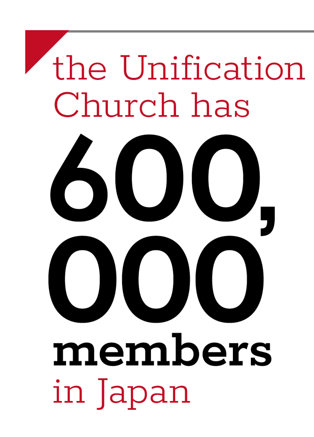It is also, according to scholars, the most threatened human right in the world today.
That right is freedom of religion, and its latest battleground is Japan, a democratic nation with that freedom baked into its laws and constitution.
Yet right now, Japan’s frenzied headlong pursuit toward the dissolution of the Family Federation for World Peace and Unification—better known as the Unification Church (UC)—threatens the survival of religions everywhere.
When the disgruntled son of a member of the UC assassinated Japan’s former prime minister, Shinzo Abe, in 2022, over his friendly relations with that church, a series of events unfolded targeting the UC rather than the murderer, who has yet to be brought to trial.
Forces hostile to religious freedom then used the tragedy to crack down on traditional religions as well as religions some stigmatize as “cults,” with a flurry of new, repressive laws more characteristic of a totalitarian state than a democracy.
“A democracy should not arbitrarily harm the right of any religion to operate freely.”
A key measure in this anti-religion campaign was the reinterpretation of an existing law to mean that civil case losses can result in the dissolution of religious groups. With that legal contortion achieved, the way was cleared to dissolve the UC—a peace-loving religion that fired no bullets, assassinated no one, and yet is being threatened with the death penalty as if it had pulled the trigger.
Global condemnation of this religious liberty crisis in Japan reached such a fever pitch that, on December 31, 2024, 32 human rights leaders, scholars, journalists and religious activists signed a statement expressing their outrage.
Signatories include Bispo Edson Galeano, Assembly of God Church, Brazil; Sam Brownback, co-chair of the International Religious Freedom Summit; Talib M. Shareef, Imam, The Nation’s Mosque, USA; and Reverend Susan Taylor, National Public Affairs Director, Church of Scientology.

“A democracy should not arbitrarily harm the right of any religion to operate freely, collect donations and transmit its faith and moral values to the next generation,” the statement read.
The signatories also took issue with certain epithets used by the Japanese government to characterize minority religions: “There is no definition of ‘controversial’ or ‘anti-social’ organizations. These labels are used against all religions by their opponents, and frequently against minority groups that are legitimate components of larger traditions such as Christianity or Buddhism.”
Journalist and author Marco Respinti, who serves on the advisory council of the European Federation for Freedom of Belief, traveled to Japan in December, where he presented a paper entitled “The Crisis of Religious Freedom and Democracy in Japan.”
In it, he traces the origins of hate against the UC, which was founded in 1954, stemming not so much from disagreements with its religious tenets, but from its firm anti-communist leanings, which were perceived as a threat to that party’s existence in Japan as the religion grew.
Respinti also illustrates how some of Japan’s egregious new laws, used in tandem with the reinterpretation of an existing law, could spell disaster for any religion. Here’s how it works: Someone files a civil suit against a religion for a violation of any of the new laws. The religion loses the civil suit. Then, according to the reinterpretation of the old law, that religion can now be dissolved because it lost a civil suit. Sound far-fetched? Not when you consider some of the new laws and how easily they can be violated.
With these guidelines in place, a new Dark Age begins.
One example is the newly invented (since Abe’s assassination) term “religious child abuse.” The phrase loosely means that children raised in a religion are abused and neglected in many different ways. A convenient “Question and Answer” guideline published in 2022 provides a broad basis for condemning every religion—large or small, established or brand new. Don’t celebrate your child’s birthday (Jehovah’s Witnesses don’t celebrate birthdays at all)? That’s religious child abuse. Does your child under 18 mention sex to the priest during confession (a Catholic rite)? That’s religious child abuse. Teach your child the fear of God and possible eternal punishment for an immoral life, as do most Christians? That’s religious child abuse. (Shame on you—scaring that child!) And, of course, that means no Japanese mom or dad may now take their children to art museums or Christian churches, where they could stumble across a Michelangelo masterpiece depicting hell.
With these guidelines in place, a new Dark Age begins where education is dangerous and one “false” move can doom an entire religion.
The United Nations has taken note of the crisis in Japan and has denounced the guidelines, stating that they “may constitute a violation of the principles of neutrality and non-discrimination, as well as potentially contributing to further stigmatization and suspicion of religious or belief minorities.”
The UN also noted with concern that the “anti-cultists” have enthusiastically helped the Japanese government in drafting the guidelines.
(And just as a note on that word “cult”: It has no specific definition and is only employed by critics of a faith to demean that faith. Scholars refrain from using it. In December 2022, the European Court of Human Rights stated that governments, national and local, cannot use the word “cult” or parallel expressions in other languages to stigmatize religious minorities in official documents and campaigns, as it is discriminatory and may incite violence. “Cult” is, in short, a four-letter word. Decent people like you and I don’t use it.)
Most assassins fail, even if they succeed in killing their quarry, as their larger target is often the group or ideals that their quarry represents. Lincoln, King, Gandhi and others—those assassinations were failures in the end, because their ideals lived on and flourished.
In the case of Shinzo Abe’s killer, however, his professed aim was to kill the Unification Church.
He may succeed.
If so, his gun is now pointed at all of us.






















